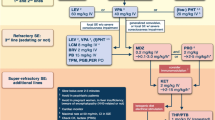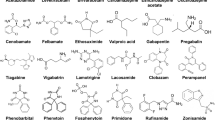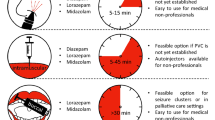Abstract
Objective
To evaluate the impact of postoperative antiepileptic drug (AED) load on seizure control in patients who underwent surgical treatment for pharmacoresistant mesiotemporal lobe epilepsy during the first two postoperative years.
Patients and methods
532 consecutive patients (48.7% males and 51.7% females) who underwent surgical treatment for mesiotemporal lobe epilepsy were retrospectively evaluated regarding effects of AED load on seizures control during the first 2 years following epilepsy surgery. We analyzed whether postoperative increases in postoperative AED load are associated with better seizure control in patients initially not seizure free, and if postoperative decreases in postoperative AED load would increase the risk for seizure persistence or recurrence. For statistical analyses, Fisher’s exact and Wilcoxon test were applied.
Results
68.9, 64.0 and 59.1% of patients were completely seizure free (Engel Ia) at 3, 12 and 24 months after surgery, respectively. Patients in whom daily drug doses were increased did not have a higher rate of seizure freedom at any of the three follow-up periods. Of 16 patients achieving secondary seizure control at 12 months after surgery, only one did so with an increase in drug load in contrast to 15 patients who experienced a running down of seizures independent of drug load increases. Decreases in drug load did not significantly increase the risk for seizure recurrence. Of postoperatively seizure free patients at 3 months after surgery in whom AED were consequently reduced, 85% remained completely seizure free at 1 year and 76% at 1 year after surgery, respectively, as opposed to 86% each when AED was not reduced (differences n.s.). Mean daily drug load was significantly lower in seizure free patients at 12 and 24 months compared to patients with ongoing seizures.
Conclusion
In this large patient cohort stratified to the epilepsy syndrome neither did a postoperative reduction in drug load significantly increase the risk for seizure relapse nor did increases in drug dosages lead to improved seizure control. Mean drug load was on average lower in seizure free- than non-seizure free patients at 12 and 24 months of follow-up. Secondary seizure control after initial postoperative seizures in > 90% of cases occurred as a running down, independent of an AED increase. Thus, the effect of the surgical intervention rather than the postoperative drug regimen was the key determinant for seizure control. This finding supports a curative role of temporal lobe surgery rather than an effect rendering the majority of patients’ pharmacoresponsive with a critical role of the antiepileptic drug regime for seizure control.


Similar content being viewed by others
References
Wiebe S, Blume WT, Girvin JP et al (2001) A randomized, controlled trial of surgery for temporal-lobe epilepsy. N Engl J Med 345:311–318. https://doi.org/10.1056/NEJM200108023450501
McIntosh AM, Wilson SJ, Berkovic SF (2001) Seizure outcome after temporal lobectomy: current research practice and findings. Epilepsia 42:1288–1307
Engel J (1993) Clinical neurophysiology, neuroimaging, and the surgical treatment of epilepsy. Curr Opin Neurol Neurosurg 6:240–249
Fauser S, Schulze-Bonhage A (2015) In response: long-term seizure outcome in 211 patients with focal cortical dysplasia. Epilepsia 56:1177–1178. https://doi.org/10.1111/epi.13017
Tellez-Zenteno JF, Dhar R, Hernandez-Ronquillo L, Wiebe S (2007) Long-term outcomes in epilepsy surgery: antiepileptic drugs, mortality, cognitive and psychosocial aspects. Brain 130:334–345. https://doi.org/10.1093/brain/awl316
Seiam AH, Dhaliwal H, Wiebe S (2011) Determinants of quality of life after epilepsy surgery: systematic review and evidence summary. Epilepsy Behav 21:441–445. https://doi.org/10.1016/j.yebeh.2011.05.005
Taylor DC, McMacKin D, Staunton H et al (2001) Patients’ aims for epilepsy surgery: desires beyond seizure freedom. Epilepsia 42:629–633
Berg AT, Langfitt JT, Spencer SS, Vickrey BG (2007) Stopping antiepileptic drugs after epilepsy surgery: a survey of U.S. epilepsy center neurologists. Epilepsy Behav 10:219–222. https://doi.org/10.1016/j.yebeh.2006.12.001
Tellez-Zenteno JF, Ronquillo LH, Jette N et al (2012) Discontinuation of antiepileptic drugs after successful epilepsy surgery. A Canadian survey. Epilepsy Res 102:23–33. https://doi.org/10.1016/j.eplepsyres.2012.04.018
Hoppe C, Poepel A, Sassen R, Elger CE (2006) Discontinuation of anticonvulsant medication after epilepsy surgery in children. Epilepsia 47:580–583. https://doi.org/10.1111/j.1528-1167.2006.00471.x
Helmstaedter C, Elger CE, Witt JA (2016) The effect of quantitative and qualitative antiepileptic drug changes on cognitive recovery after epilepsy surgery. Seizure 36:63–69. https://doi.org/10.1016/j.seizure.2016.02.001
Aldenkamp AP, Alpherts WC, Sandstedt P et al (1998) Antiepileptic drug-related cognitive complaints in seizure-free children with epilepsy before and after drug discontinuation. Epilepsia 39:1070–1074
Cramer JA, Mintzer S, Wheless J, Mattson RH (2010) Adverse effects of antiepileptic drugs: a brief overview of important issues. Expert Rev Neurother 10:885–891. https://doi.org/10.1586/ern.10.71
Langfitt JT, Holloway RG, McDermott MP et al (2007) Health care costs decline after successful epilepsy surgery. Neurology 68:1290–1298. https://doi.org/10.1212/01.wnl.0000259550.87773.3d
Cole AJ, Wiebe S (2008) Debate: should antiepileptic drugs be stopped after successful epilepsy surgery? Epilepsia 49(Suppl 9):29–34. https://doi.org/10.1111/j.1528-1167.2008.01924.x
McIntosh AM, Kalnins RM, Mitchell LA et al (2004) Temporal lobectomy: long-term seizure outcome, late recurrence and risks for seizure recurrence. Brain 127:2018–2030. https://doi.org/10.1093/brain/awh221
Spencer SS, Berg AT, Vickrey BG et al (2005) Predicting long-term seizure outcome after resective epilepsy surgery: the multicenter study. Neurology 65:912–918. https://doi.org/10.1212/01.wnl.0000176055.45774.71
Yardi R, Irwin A, Kayyali H et al (2014) Reducing versus stopping antiepileptic medications after temporal lobe surgery. Ann Clin Transl Neurol 1:115–123. https://doi.org/10.1002/acn3.35
Lossius MI, Hessen E, Mowinckel P et al (2008) Consequences of antiepileptic drug withdrawal: a randomized, double-blind study (Akershus Study). Epilepsia 49:455–463. https://doi.org/10.1111/j.1528-1167.2007.01323.x
Kim YD, Heo K, Park SC et al (2005) Antiepileptic drug withdrawal after successful surgery for intractable temporal lobe epilepsy. Epilepsia 46:251–257. https://doi.org/10.1111/j.0013-9580.2005.28004.x
Pimentel J, Peralta AR, Campos A et al (2012) Antiepileptic drugs management and long-term seizure outcome in post surgical mesial temporal lobe epilepsy with hippocampal sclerosis. Epilepsy Res 100:55–58. https://doi.org/10.1016/j.eplepsyres.2012.01.010
Berg AT, Vickrey BG, Langfitt JT et al (2006) Reduction of AEDs in postsurgical patients who attain remission. Epilepsia 47:64–71. https://doi.org/10.1111/j.1528-1167.2006.00371.x
Lachhwani DK, Loddenkemper T, Holland KD et al (2008) Discontinuation of medications after successful epilepsy surgery in children. Pediatr Neurol 38:340–344. https://doi.org/10.1016/j.pediatrneurol.2008.01.010
Schmidt D, Loscher W (2003) How effective is surgery to cure seizures in drug-resistant temporal lobe epilepsy? Epilepsy Res 56:85–91
Schiller Y, Cascino GD, So EL, Marsh WR (2000) Discontinuation of antiepileptic drugs after successful epilepsy surgery. Neurology 54:346–349
Al-Kaylani M, Konrad P, Lazenby B et al (2007) Seizure freedom off antiepileptic drugs after temporal lobe epilepsy surgery. Seizure 16:95–98. https://doi.org/10.1016/j.seizure.2006.10.007
Kwan P, Arzimanoglou A, Berg AT et al (2010) Definition of drug resistant epilepsy: consensus proposal by the ad hoc Task Force of the ILAE Commission on Therapeutic Strategies. Epilepsia 51:1069–1077. https://doi.org/10.1111/j.1528-1167.2009.02397.x
Engel JJ, Van Nes PC, Rasmussen TB, Ojemann LM (1993) Outcome with respect to epileptic seizures in surgical treatment of the epilepsies. N Y Raven Press, New York, pp 609–621
WHO (2015) WHO Collaborating Centre for Drug Statistics Methodology, Guidelines for ATC classification and DDD assignment
Schmidt D, Baumgartner C, Loscher W (2004) The chance of cure following surgery for drug-resistant temporal lobe epilepsy. What do we know and do we need to revise our expectations? Epilepsy Res 60:187–201. https://doi.org/10.1016/j.eplepsyres.2004.07.004
Salanova V, Andermann F, Rasmussen T et al (1996) The running down phenomenon in temporal lobe epilepsy. Brain 119(Pt 3):989–996
Ladino LD, Hernandez-Ronquillo L, Tellez-Zenteno JF (2014) Management of antiepileptic drugs following epilepsy surgery: a meta-analysis. Epilepsy Res 108:765–774. https://doi.org/10.1016/j.eplepsyres.2014.01.024
Kuzniecky R, Rubin ZK, Faught E, Morawetz R (1992) Antiepileptic drug treatment after temporal lobe epilepsy surgery: a randomized study comparing carbamazepine and polytherapy. Epilepsia 33:908–912
Griffin CT, Abastillas ME, Armon C et al (2004) Early antiepileptic drug reduction following anterior temporal lobectomy for medically intractable complex partial epilepsy. Seizure 13:434–437. https://doi.org/10.1016/j.seizure.2003.10.004
Tanriverdi T, Ajlan A, Poulin N, Olivier A (2009) Morbidity in epilepsy surgery: an experience based on 2449 epilepsy surgery procedures from a single institution. J Neurosurg 110:1111–1123. https://doi.org/10.3171/2009.8.JNS08338
Kerling F, Pauli E, Lorber B et al (2009) Drug withdrawal after successful epilepsy surgery: how safe is it? Epilepsy Behav 15:476–480. https://doi.org/10.1016/j.yebeh.2009.05.016
Boshuisen K, Braams O, Jennekens-Schinkel A et al (2009) Medication policy after epilepsy surgery. Pediatr Neurol 41:332–338. https://doi.org/10.1016/j.pediatrneurol.2009.04.025
Park KI, Lee SK, Chu K et al (2010) Withdrawal of antiepileptic drugs after neocortical epilepsy surgery. Ann Neurol 67:230–238. https://doi.org/10.1002/ana.21884
Rathore C, Sarma SP, Radhakrishnan K (2011) Prognostic importance of serial postoperative EEGs after anterior temporal lobectomy. Neurology 76:1925–1931. https://doi.org/10.1212/WNL.0b013e31821d74b3
Das RR, Artsy E, Hurwitz S et al (2012) Outcomes after discontinuation of antiepileptic drugs after surgery in patients with low grade brain tumors and meningiomas. J Neurooncol 107:565–570. https://doi.org/10.1007/s11060-011-0779-y
Menon R, Rathore C, Sarma SP, Radhakrishnan K (2012) Feasibility of antiepileptic drug withdrawal following extratemporal resective epilepsy surgery. Neurology 79:770–776. https://doi.org/10.1212/WNL.0b013e3182644f7d
Tanriverdi T, Olivier A, Poulin N et al (2008) Long-term seizure outcome after mesial temporal lobe epilepsy surgery: corticalamygdalohippocampectomy versus selective amygdalohippocampectomy. J Neurosurg 108:517–524. https://doi.org/10.3171/JNS/2008/108/3/0517
Malmgren K, Edelvik A (2017) Long-term outcomes of surgical treatment for epilepsy in adults with regard to seizures, antiepileptic drug treatment and employment. Seizure 44:217–224. https://doi.org/10.1016/j.seizure.2016.10.015
Reinholdson J, Olsson I, Edelvik A et al (2015) Long-term follow-up after epilepsy surgery in infancy and early childhood—a prospective population based observational study. Seizure 30:83–89. https://doi.org/10.1016/j.seizure.2015.05.019
Braathen G, Melander H (1997) Early discontinuation of treatment in children with uncomplicated epilepsy: a prospective study with a model for prediction of outcome. Epilepsia 38:561–569
Verrotti A, Morresi S, Basciani F et al (2000) Discontinuation of anticonvulsant therapy in children with partial epilepsy. Neurology 55:1393–1395
Peters AC, Brouwer OF, Geerts AT et al (1998) Randomized prospective study of early discontinuation of antiepileptic drugs in children with epilepsy. Neurology 50:724–730
Zeng TF, An DM, Li JM et al (2012) Evaluation of different antiepileptic drug strategies in medically refractory epilepsy patients following epilepsy surgery. Epilepsy Res 101:14–21. https://doi.org/10.1016/j.eplepsyres.2012.02.013
Helmstaedter C, Witt JA (2017) How neuropsychology can improve the care of individual patients with epilepsy. Looking back and into the future. Seizure 44:113–120. https://doi.org/10.1016/j.seizure.2016.09.010
Uijl SG, Leijten FS, Arends JB et al (2008) Prognosis after temporal lobe epilepsy surgery: the value of combining predictors. Epilepsia 49:1317–1323. https://doi.org/10.1111/j.1528-1167.2008.01695.x
Spencer SS, Spencer DD, Williamson PD, Mattson RH (1981) Ictal effects of anticonvulsant medication withdrawal in epileptic patients. Epilepsia 22:297–307
Schmidt D, Baumgartner C, Loscher W (2004) Seizure recurrence after planned discontinuation of antiepileptic drugs in seizure-free patients after epilepsy surgery: a review of current clinical experience. Epilepsia 45:179–186
van Veelen CW, van Rijen PC, Debets RM et al (2001) Dutch Collaborative Epilepsy Surgery Program: reduction of seizures, operative complications and tapering of medication in 338 patients, 1973–1998. Ned Tijdschr Geneeskd 145:2223–2228
Boshuisen K, Arzimanoglou A, Cross JH et al (2012) Timing of antiepileptic drug withdrawal and long-term seizure outcome after paediatric epilepsy surgery (TimeToStop): a retrospective observational study. Lancet Neurol 11:784–791. https://doi.org/10.1016/S1474-4422(12)70165-5
Lee SY, Lee JY, Kim DW et al (2008) Factors related to successful antiepileptic drug withdrawal after anterior temporal lobectomy for medial temporal lobe epilepsy. Seizure 17:11–18. https://doi.org/10.1016/j.seizure.2007.05.014
Janszky J, Janszky I, Schulz R et al (2005) Temporal lobe epilepsy with hippocampal sclerosis: predictors for long-term surgical outcome. Brain 128:395–404. https://doi.org/10.1093/brain/awh358
Englot DJ, Chang EF (2014) Rates and predictors of seizure freedom in resective epilepsy surgery: an update. Neurosurg Rev 37:389–404. https://doi.org/10.1007/s10143-014-0527-9 (discussion 404–5)
Grivas A, Schramm J, Kral T et al (2006) Surgical treatment for refractory temporal lobe epilepsy in the elderly: seizure outcome and neuropsychological sequels compared with a younger cohort. Epilepsia 47:1364–1372. https://doi.org/10.1111/j.1528-1167.2006.00608.x
Lee YJ, Lee JS (2013) Temporal lobe epilepsy surgery in children versus adults: from etiologies to outcomes. Korean J Pediatr 56:275–281. https://doi.org/10.3345/kjp.2013.56.7.275
Tonini C, Beghi E, Berg AT et al (2004) Predictors of epilepsy surgery outcome: a meta-analysis. Epilepsy Res 62:75–87. https://doi.org/10.1016/j.eplepsyres.2004.08.006
Radhakrishnan K, So EL, Silbert PL et al (1998) Predictors of outcome of anterior temporal lobectomy for intractable epilepsy: a multivariate study. Neurology 51:465–471
Schmeiser B, Zentner J, Steinhoff BJ et al (2017) The role of presurgical EEG parameters and of reoperation for seizure outcome in temporal lobe epilepsy. Seizure 51:174–179. https://doi.org/10.1016/j.seizure.2017.08.015
Grote A, Witt JA, Surges R et al (2015) A second chance-reoperation in patients with failed surgery for intractable epilepsy: long-term outcome, neuropsychology and complications. J Neurol Neurosurg Psychiatry. https://doi.org/10.1136/jnnp-2015-310322
Author information
Authors and Affiliations
Corresponding author
Ethics declarations
Funding
This research did not receive any specific Grant from funding agencies in the public, commercial, or not-for-profit sectors.
Conflicts of interest
There are no conflicts of interest.
Ethical approval
This study was approved by the local ethic committee of the University of Freiburg (EK-Freiburg 263/14).
Publication
The present manuscript has not been submitted for publication elsewhere and will not be submitted elsewhere while under consideration for this journal.
Rights and permissions
About this article
Cite this article
Schmeiser, B., Steinhoff, B.J. & Schulze-Bonhage, A. Does early postoperative drug regimen impact seizure control in patients undergoing temporal lobe resections?. J Neurol 265, 500–509 (2018). https://doi.org/10.1007/s00415-017-8700-z
Received:
Revised:
Accepted:
Published:
Issue Date:
DOI: https://doi.org/10.1007/s00415-017-8700-z




